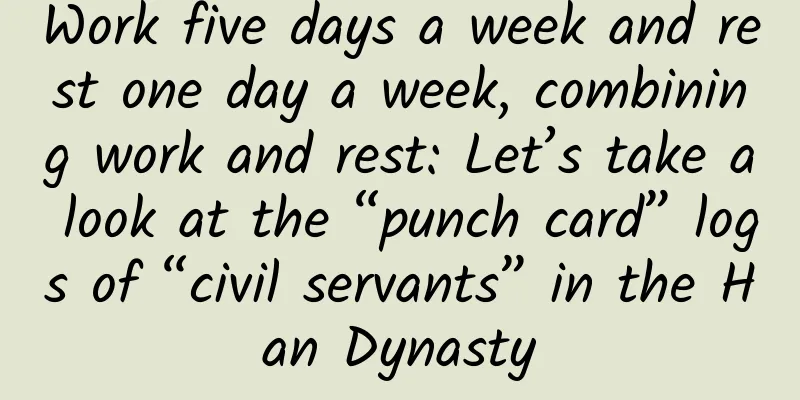Work five days a week and rest one day a week, combining work and rest: Let’s take a look at the “punch card” logs of “civil servants” in the Han Dynasty

|
Recently, General Secretary Xi Jinping visited the exhibition of unearthed Qin and Han bamboo slips during his visit to the Yunmeng County Museum in Hubei Province, bringing the ancient cultural relics of "bamboo slips" back into the public eye. The "Eighteen Kinds of Qin Laws" exhibited in the exhibition show that as early as more than 2,200 years ago, my country's ancient legal system had already become a system. In Lianyungang City, a batch of "Yinwan Han bamboo slips" unearthed in 1993 are also rare and precious cultural relics. They are not only rich in content, but also reveal many historical mysteries. Now this batch of Han bamboo slips has become one of the "treasures of the town hall" of the Lianyungang City Museum, and the protection, research, and interpretation of this batch of bamboo slips are being carried out intensively. In February 1993, archaeological experts conducted a rescue excavation of a group of Western Han family tombs in Yinwan Village, Donghai County, Lianyungang. The owner of Tomb No. 6 was identified as Shi Rao, a historian of Donghai Gongcao who lived in the late Western Han Dynasty. 133 bamboo slips and 23 wooden slips were found in his tomb, which are the famous "Yinwan Han Bamboo Slips". Professor Li Junming of the Center for Research and Protection of Excavated Documents of Tsinghua University introduced that the bamboo slips unearthed from Tomb No. 6 of Yinwan, Lianyungang, contain classics and documents, which are cleverly combined. They must have been specially selected by Shi Rao or his family for burial. Among them, "Junxiong's Silk Square Ti Zhongwu Shu" records eight catalogs of classics, reflecting the preferences and ideological tendencies of the selector. In particular, the full text of "Shenwu Fu (Fu)" was copied, indicating that Shi Rao's emotions or resonance with it. "Ji Bu" and related books can reflect the core of Shi Rao's business work, so they were also copied and buried, thus providing us with precious information for studying the main projects and methods of state management in the Han Dynasty. It is particularly noteworthy that the Diary of the Second Year of Yuanyan is arranged according to the daily heavenly stems and earthly branches, and is mainly a record of official activities. It records Shi Rao's daily residence and whereabouts, reflecting his diligent and dedicated work attitude, and is worth pondering today. What kind of person is Shi Rao? What happened in the second year of Yuanyan? Jiang Rui, curator of Lianyungang Museum, introduced that the second year of Yuanyan is 11 BC, which is more than 2,000 years ago. "Shishi" means "taking office and governing affairs". "Diary of Shirao in the Second Year of Yuanyan" is a record of Shirao's various activities in that year, including business trips, official business, and acting as a director. Interestingly, the "diary" used by Shirao is a pre-compiled calendar of the second year of Yuanyan (11 BC) (equivalent to the "almanac" of later generations). If Shirao has something to record on a certain day, he will record it in the blank space under the heavenly stem and earthly branch of that day. Jiang Rui pointed out that looking through the more than 180 diaries, it can be found that Shi Rao recorded the most about his accommodation. He lived in the residence provided by the government for officials for 81 days a year. The "she" in the "dormitory" mentioned in the diary refers to the "Lishe" of the Donghai County Taishou Mansion, that is, the residence provided by Donghai County for officials. The specific location is in Tan County, the county seat of Donghai County, today's Tancheng, Shandong. During this year, Shi Rao also went on "business trips" to the State of Chu adjacent to Donghai County four times, went on official business to Langya County twice, and went on short-term business trips in Donghai County many times. The "State of Chu" mentioned here is the fiefdom set up by Emperor Xuan of the Han Dynasty for his son Liu Xiao, which is equivalent to the central part of Xuzhou City, Jiangsu Province and the eastern part of Huaibei City, Anhui Province. In his diary, Shi Rao wrote that he had been to Pengcheng, Wuyuan, Lü, Zhiqiu, Wu and other counties in Chu State, Gaoguang and Dongwu counties in Langya County, and that he had stayed in places such as "Chuanshe", "Ting", "You", "Chen Shaoping's House" and "Zi Yanshe" during his business trips, which refer to the houses of Chu State and Langya County for receiving foreign business travelers or the homes of Chu State officials who had close relations with Shi Rao. The diary basically does not specify the specific affairs of Shi Rao's "business trip" to Chu State and other places, but it can be inferred that he was busy with work, traveled to many places, and stayed overnight in different places. Why did Shi Rao take the trouble to record his accommodation in his diary? Professor Song Jie of Capital Normal University believes that during the Qin and Han dynasties, the government had very strict management of ordinary officials, stipulating that grassroots officials usually worked and lived in the official office, and could only leave the official office to go home on holidays to reunite with their wives and children and take a short rest. "The Way of Being an Official" in the "Shuihudi Qin Tomb Bamboo Slips" states that "officials have five mistakes", one of which is "settling down at home and forgetting the official office". If an official goes home privately or is found not to be at work by his superiors during inspection, it is called "private return" or "absent from the office", and he will be subject to more severe punishment. Therefore, Shi Rao recorded his accommodation on working days and during business trips in detail in his diary, just to have evidence when his superiors evaluate him, so as to keep it for future reference and avoid bringing trouble to himself. In the Han Dynasty, the regular vacation for officials in the capital was called "Xiu Mu", and they could get one day of rest every five days, which was the so-called "one bath every five days". There are very few records in literature or archaeological materials about the "Xiu Mu" system for county officials. The excavation of Yinwan Han bamboo slips provides scholars with precious information for studying the vacation system of county officials in the Han Dynasty. Zhao Xu, director of the Science and Information Department of Lianyungang Museum, introduced that according to the analysis of Yinwan Han bamboo slips, county officials like Shi Rao could also enjoy holidays. There are also several records of Shi Rao's "staying at home" in the "Diary", which can be inferred to be records of Shi Rao getting a holiday to go home and rest. Considering the burial custom of the Han Dynasty people to be buried in their hometowns, Shi Rao's home should not be far from the location of Yinwan Han Tomb, and it is 20 to 30 kilometers away from Tancheng, the seat of Donghai County. According to the diary, Shi Rao recorded about 287 "working days" and 41 "rest days" in this year, combining work and rest, and reasonably allocating work and rest time. County officials in the Han Dynasty could also take leave due to illness or the death of a family member. The diary shows that Shi Rao took at least 8 days of sick leave in this year, and he also took 13 days of mourning leave because of the death of a family member. In addition, officials in the Han Dynasty could enjoy public holidays on the summer solstice, winter solstice, dog days, and twelfth day, which is also reflected in the diary. Professor Li Yingchun of the Northwest Normal University Institute of Bamboo Slips said that it is worth noting that in the second year of Yuanyan, Shi Rao's official position changed continuously. The diary shows that on July 19, he was arranged to act as "Fa Cao", on August 28, he was appointed as "Ci Cao Shu Zuo", and on October 19, he was arranged to act as "Gong Cao". Gong Cao is the most powerful position among the county officials. It is important and can be regarded as the confidant of the governor, who is in charge of specific matters such as official assessment and promotion. "Han Guan Yi" says: "Duyou, Gong Cao, the highest position in the county". In Tomb No. 6, administrative documents and archives related to Donghai County, such as Ji Bu, Li Yuan Bu, Wu Ku Bing Cha Qi Ji Bu, were buried with the deceased, which also reflects that Shi Rao was in charge of a wide range of affairs during his lifetime. So why did Shi Rao have such a "good official career" in such a short time? Professor Song Jie's research shows that from the documents buried with Shi Rao's tomb, he was proficient in literature, calendar calculation, mathematics and various government affairs. He also led soldiers to hunt down bandits (there is a record of Shi Rao hunting down bandits in Xiangben County, Donghai County) and was a capable official with both civil and military talents. Therefore, the prefect entrusted him with important tasks. The second year of Yuanyan was probably also a very dazzling year in Shi Rao's official career. Therefore, after his death, his family buried his diary of that year with him, allowing him to take the glory of his life to another world. Xu Ning Yu Feng |
<<: Which one makes you gain weight more easily, eating noodles or eating rice?
Recommend
How much does it cost to develop a Mianyang movie mini program? Mianyang movie applet development price inquiry
How much does it cost to join the movie mini prog...
The user base has grown by 188% in three months. Here are the secrets of LeTV's success in TV games
"The TV game market has unlimited potential,...
Changsha tea tasting takeaway arrangement, tea service contact information, very reliable
Changsha tea takeaway arrangement, tea service co...
Can't stop eating melon seeds? Your melon seed addiction is not entirely your fault!
Melon seeds, as the well-deserved king of nationa...
Android system Bar immersive perfect compatibility solution
introduction Since Android 5.0, Android has intro...
New nanotechnology could make circuit boards as thin as paper
According to foreign media reports, Oregon State ...
Operators, how can you track hot spots correctly and efficiently?
I believe that our operations colleagues, especia...
How to talk nonsense seriously, just multiple columns of data
The morning news said that the consumer price ind...
What? Three-quarters of shark species are endangered? They are also a great threat to humans
Expert of this article: Liu Yadan, researcher, de...
5 tips for event management!
Event operation is a type of operation. The autho...
9 mysterious maps, how many can you recognize?
Loading long image... Source: National Geographic...
Technology Morning News | Man-made spacecraft touches the sun for the first time
News Station Photo by Xinhua News Agency reporter...
Can body temperature generate electricity? Chinese scientists achieve material breakthrough!
Recently, the team of Professor Zhang Qian and Pr...
Color TV enterprises have to fight a tough battle in the post-entry hardware era
The impact of the expiration of energy-saving and...









